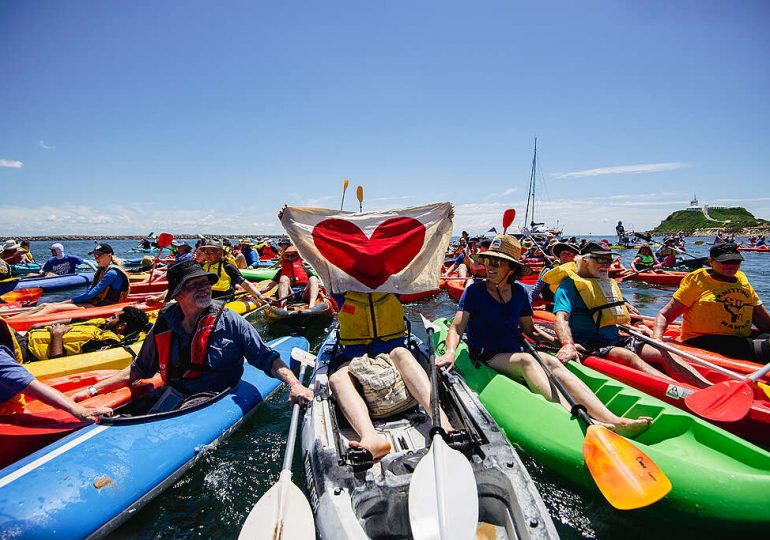As the climate crisis intensifies, Australians are demanding action—and many are doing so by taking to the streets, beaches, and waterways. In Newcastle, Rising Tide’s planned “People’s Blockade of the World’s Largest Coal Port” is gearing up to be a bold statement for climate justice. But with the Supreme Court ruling in favour of NSW Police to block the protest from going ahead, a critical question hangs in the air: Is the right to peaceful assembly truly safe in Australia?
The people organising and attending these protests believe in a future where fossil fuel interests don’t overshadow climate justice, and the stakes for that vision couldn’t be higher.
Heart banner at Rising Tide People’s Blockade at Newcastle Port calling for a complete halt on new coal, oil, and gas projects
Why the Right to Peaceful Assembly Matters
The right to peaceful assembly is foundational to democracy and justice. From women’s suffrage to environmental protection, peaceful gatherings have always pushed society forward. As Greenpeace Australia Pacific CEO David Ritter put it, “The right to peaceful assembly is a fundamental pillar of a healthy democracy and a basic right of all Australians.” When police challenge climate protests in court, it’s more than a bureaucratic move—it’s a step toward silencing public voices.
Australia’s tradition of public assembly is rooted in the belief that change requires showing up and speaking out. Ritter added, “From women’s rights to vote to worker’s rights, so much of what we take for granted today was won by people coming together to take a stand against injustice, discrimination and environmental destruction..” The stakes may feel high for those who want to peacefully assemble, but this is exactly what a democracy should encourage.
The People’s Blockade: Rising Tide’s Mission
Rising Tide’s “People’s Blockade” is set to be one of the most significant climate uprisings in Australian history. The Blockade in Newcastle will be followed by an occupation on the lawns of Parliament house in Canberra. The whole event will run from Tuesday 19th November until Thursday 28th. Thousands of people will paddle into the port on kayaks and rafts, halting coal exports in a vivid demonstration for climate action.
Why Newcastle? The Symbolism of the World’s Largest Coal Port
For many, Newcastle isn’t just a city; it’s a symbol of the coal industry’s grip on Australia. Exporting 165 million tons of coal a year on average, the port is a powerful reminder of Australia’s role as the world’s third-largest fossil fuel exporter. Rising Tide’s choice to protest in Newcastle emphasises the urgent need for a just energy transition, especially in areas where coal exports are a primary economic force.
As Ritter emphasised, “Coal, oil, and gas are the key drivers of climate change, fuelling worsening bushfires, storms, droughts, and heatwaves in Australia, costing us billions, harming our health, taking lives and jeopardising peoples’ livelihoods.” The damage is already here, and peaceful protests like Rising Tide’s are an expression of Australians’ deep concern for their land, their communities, and their future.
Key Demands of Rising Tide’s People’s Blockade:
Immediate Cancellation of New Fossil Fuel Projects: The blockade advocates for a complete halt on new coal, oil, and gas projects.
Tax on Fossil Fuel Export Profits: Rising Tide is calling for a 78% tax on fossil fuel profits to fund the transition of local communities and industries toward sustainable solutions.
End Coal Exports from Newcastle by 2030: Newcastle’s port, the largest coal export port in the world, is at the center of Rising Tide’s call to phase out coal exports entirely by 2030.
Rising Tide’s mission is to spark serious climate action, but the blockade also aims to give people a voice and place in this fight. As David Ritter noted, “As the world’s third largest fossil fuel exporter, Australia is a major driver of the climate crisis. Peaceful assembly to call on governments to accelerate the transition away from climate-wrecking fossil fuels is legitimate and valuable. Greenpeace Australia Pacific stands with all peaceful climate defenders who are advocating for real climate action.”
NSW Police and the Crackdown on Protest Rights
NSW police have been putting up barriers—literally and legally—to climate protests, and the Newcastle blockade is no exception. Citing safety concerns, police have taken Rising Tide to court, and won, arguing the protest should not be allowed. But this is not the first time police have tried to clamp down on climate activists.
Zack Schofield, one of the organisers, explained that Rising Tide “approached the police in good faith,” only to be met with resistance. “We’re really disappointed that New South Wales Police has chosen to use the resources of the supreme court to attempt to challenge this community-positive, family-friendly climate [event] in again, the hottest year on record.”
The situation in NSW speaks to a larger trend of targeting climate protesters, with civil rights organisations stepping in to criticise the government’s actions. “This attempt by NSW Police is another example of the continuing crackdown on people exercising their right to freedom of assembly in NSW,” said Amnesty International’s Nikita White. “Peaceful protests, including non-violent direct actions, are how people create change and make the world a better place.”
Greenpeace Stands with Climate Defenders
Greenpeace Australia Pacific has thrown its full support behind Rising Tide and every Australian who chooses to stand up for the environment. “Large numbers of Australians gathering in Newcastle expressing their deep concern about the damage being caused by the coal industry should be welcomed for what it is – people caring deeply about the future of our country and the safety of our children.” says Ritter.
The people organising and attending these protests are Australians who are committed to ensuring a safe future for all. Greenpeace sees these gatherings as part of a broader movement for climate justice and a necessary action when faced with the destructive impacts of fossil fuels. Peaceful protests amplify voices and bring attention to the urgent need for change.
The Importance of Peaceful Assembly for Climate Justice
A Voice Against Environmental Injustice: Peaceful protest lets communities speak out on policies that threaten their health and environment.
Historical Precedent for Social Change: From voting rights to environmental protection, peaceful assemblies have historically driven meaningful advancements.
A Check on Government and Corporate Power: Protests shine a light on pressing issues like fossil fuel dependence, issues that governments and corporations might otherwise ignore.
Public Solidarity in Times of Crisis: Coming together for a cause shows unity and can inspire a broader public movement for change.
This November, Australians paddling out into Newcastle’s waters are not just blocking coal exports—they’re embodying a vision for a fairer, more sustainable world. The People’s Blockade may face challenges, but its message will resonate long after the kayaks are back on shore. In standing with climate defenders, Greenpeace and countless Australians are showing that the right to peaceful assembly is alive and well, and it remains a crucial part of building a just and liveable future.
No new fossil fuels
Sign the petition to demand the Australian Government stop new coal, oil and gas projects now.




